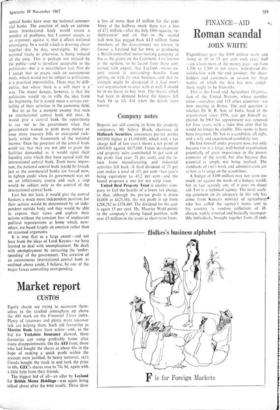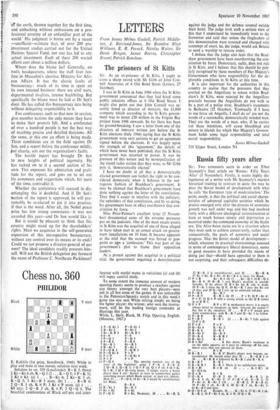Roman scandal
FINANCE—AID JOHN WHITE
Expenditure past the S100 million mark and rising at 10 to 15 per cent each year; staff
—on w horn most of the money goes—up from 1,700 to 5,300 in ten years; widespread dis- satisfaction with the end product; the share- holders and customers in session for three weeks, of which the first has now ended : there ought to be fireworks.
This is the Food and Agriculture Organisa- tion of the United Nations, whose member states—ourselves and 113 other countries—are now meeting in Rome. The real question is whether Dr B. R. Sen, of India, head of the organisation since 1956, can get himself re- elected. In 1963 his appointment was renewed for four years, with a rider that after that he would no longer be eligible. This seems to have been forgotten. Dr Sen is a candidate all right, and a wily and experienced candidate, too.
He find himself under pressure now, not only because FAO is a large, well-heeled organisation potentially of great importance to the poorer countries of the world, but also because that potential is simply not being realised. The standards of 1:no's work and administration are so low as to verge on the scandalous.
A budget of $100 million may not seem too much, set against the needs of a hungry world; but in fact scarcely any of it goes on direct aid. Fao is a technical agency. The most scath- ing comment on its adequacy in this role has come from Kenya's minister of agriculture' who has called the agency's teams sent to his country 'a random collection of ill- chosen, widely assorted and basically incompat- ible individuals, brought together from all ends
VI the earth, thrown together for the first time, and embarking without enthusiasm on a pro- fessional scrutiny of an unfamiliar part of the world.' His judgment is borne out by a recent —unofficial—estimate that, of over 200 pre- investment studies carried out for the United Nations Special Fund, not one has led to any actual investment. Each of these 200 wasted efforts cost about a million dollars.
Where does the blame lie? Generally, on FAo's headquarters, where the staff lives tax- free in Mussolini's abortive Ministry for Afri- can Affairs. It has the classic faults of bureaucracy: much of its time is spent on its own internal business: there are civil wars, departmental rivalries, intense backbiting. But specifically the blame must be laid at Dr Sen's door. He has called this bureaucracy into being without delegating responsibility to it.
FAO conferences, such as that now in session, give member nations the only means they have to make their protests felt. And a conference of over a hundred people is not the best way of reaching precise and detailed decisions. All the same, at this one an effort is being made. Three candidates are in the field against Dr Sen, and a report before the conference mildly, Put clearly, sets out the organisation's faults.
The hostile report has brought Dr Sen to new heights of political ingenuity. He has tacked on to it a second section of his own. This expresses his admiration and grati- tude for the report, and goes on to set out his comments and suggestions which, for most of the time, contradict it.
Whether the conference will succeed in dis- entangling this is doubtful. And if Dr Sen's *action of the report is approved, he will pre- sumably be re-elected to put it into practice, if that is the word. After all, the Nobel peace prize has few strong contestants—it was not awarded this year—and Dr Sen would like it.
But it would be pleasant to think that this country might stand up for the shareholders' rights. Must we acquiesce in the self-generated expansion of this introspective bureaucracy, without any control over its means or its ends? Could we not propose a director-general of our own? The ideal candidate readily presents him- self. Will not the British delegation put forward the name of Professor C. Northcote Parkinson?







































 Previous page
Previous page